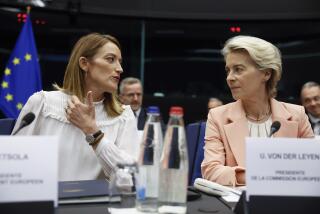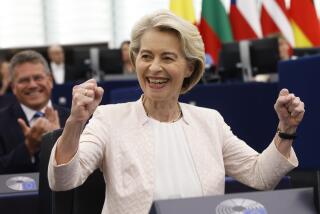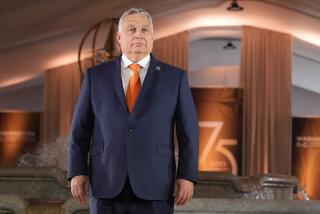EU Rolls Out Its New, Improved Commissioners
- Share via
PARIS — Western Europe got its closest thing yet to a supranational government Friday, as former Italian Prime Minister Romano Prodi unveiled a 20-member European Commission whose most immediate task will be living down the alleged cronyism and incompetence of its predecessor.
The incoming executive for the 15-nation European Union, the world’s largest trade bloc, will face a bevy of daunting tasks. Among them: managing increasingly testy economic relations with the United States, deciding Europe’s role in rebuilding Kosovo and expanding the EU eastward into the former Soviet bloc.
U.S. officials’ attention quickly focused on the person Prodi has chosen for arguably the commission’s most important portfolio: international trade. Pascal Lamy, 51, a French Socialist, represents the nation and political camp that to many on the opposite side of the Atlantic epitomize Old World protectionism.
Lamy, nicknamed “Exocet” after a French-made missile, was chief of staff to former European Commission President Jacques Delors. “My principal defect is brutality,” he has said.
It is an open secret at EU headquarters in Brussels that personal relations between Lamy’s predecessor, Leon Brittan, and U.S. Trade Representative Charlene Barshefsky have become so poor that the two prefer to communicate in writing. The appointment of Lamy, a fluent English speaker, should allow a fresh start.
Most important, the Frenchman, who had been working at the newly privatized Credit Lyonnais bank, will represent the EU at negotiations scheduled to open in Washington state at the end of the year on further liberalization in international commerce.
“There should be a high old time out there in Seattle,” a Brussels-based diplomat quipped, anticipating that Lamy will espouse existing European policies that the Clinton administration denounces as rank protectionism. Foremost among them are generous farm subsidies and limits on the entry of some U.S. agricultural products.
The old European Commission, chaired by Jacques Santer of Luxembourg, resigned en bloc March 15 after an independent probe unearthed numerous examples of mismanagement and corruption. Last week, when Santer’s commissioner for telecommunications, Martin Bangemann of Germany, announced that he was taking a job with a Spanish telecommunications firm for more than $1 million a year, it was one more blow to the commission’s reputation. Furious, ambassadors from the 15 EU countries demanded that the European Court of Justice investigate Bangemann.
Prodi, 59, has promised a cultural revolution to prove to Europeans that the EU is working for their benefit, and he has a mandate that is new in key respects. For the first time, the commission president is not simply first among equals but can reassign commissioners if he believes they are not doing a good job. In the wake of the recent scandals, Prodi has also made it clear that officials whose honesty or ability is impugned will be expected to resign if asked.
“For the first time, we have a president who refers to his ‘government’ and will operate in a prime ministerial style,” observed Stanley Crossick, chairman of the European Policy Center, a private Brussels think tank. Crossick believes that will limit the policymaking latitude of commissioners such as Lamy.
Prodi, who headed a center-left government in Italy from 1996 to 1998, is considered an economic liberal. He had a much freer hand than his predecessors in selecting the members of his commission and assigning portfolios, though there was a lot of horse trading behind closed doors.
The commission must be formally approved by the European Parliament, and investiture is scheduled for Sept. 15.
Outside Europe, the best known of Prodi’s choices is Chris Patten, 55, the British Conservative who oversaw the hand-over of Hong Kong to China. He will be in charge of the EU’s external relations.
Though conservative parties triumphed in last month’s elections to the European Parliament, Prodi’s commission is made up of 11 left-of-center politicians and nine from the right--an imbalance that could cause frictions with the parliament. There are five women and four holdovers from the Santer era.
More to Read
Sign up for Essential California
The most important California stories and recommendations in your inbox every morning.
You may occasionally receive promotional content from the Los Angeles Times.













